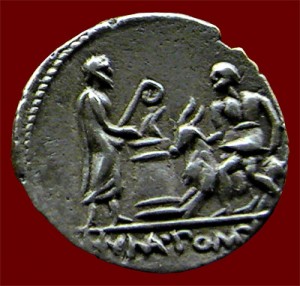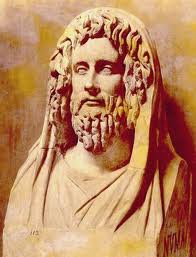The first lesson that we as cultores learn from Numa is to live an ethical life in accordance with Roman virtues. Among these virtues are justice, honesty, fidelity, piety, liberality, and frugality, along with fortitude, prudence, and temperance. The Religio Romana is a tradition of practice more so than one of belief. This means that cultores are to actively practice Roman virtues at all times, not only out of conviction and resolve to live an ethical life, as we have chosen to do, but also as a requirement for purifying ourselves before performing Roman ritual. Maintaining ritual purity is a major concern in the ancient religions of the Mediterranean region. Without ritual purity, we could not properly participate in ritual and would thus become cut off from the Gods, from our family, and from our community. In Egyptian texts, in texts of Judaism, among the Greeks and Romans there is great concern over violating taboos that cause impurity, and then over what rites are needed to restore ritual purity. In Roman tradition purification of the body may be done by water, either by sprinkling the head and hands in rites offered to terrestrial deities and the dead, or bathing fully for rites offered to celestial Gods. There is purification by fire and by fumigations, as occur during the festivals of Parilia and Portunalia. There is purification by air, by sweeping, and by whipping in the rites of Hercules, Fornicalia, and Lupercalia, respectively. Ritual space has to be defined and purified just as the body of all those who would practice at a Roman ritual. And every object, implement, offering, and person who enters a ritual space must be ritually pure lest it pollute the place and negate the ritual. However, no purification of the physical body can clean the guilty mind or an impure soul. Ethical practice thus is bound to our ritual practice, where first and foremost we are to live ethically to relieve our conscious of any restraint or obligation.

The first virtue exemplified by Numa Pompilius is that of pietatis. Roman piety concerns giving due respect to your parents and other family members, especially in performing rites for deceased family members, your Lares, and to faithfully continue rites for the Gods vowed by your ancestors. The finest example of Roman piety is the story of Fabius Dorso. While the Gauls held the Capitolium under siege, Dorso descended its heights wearing a toga rather than armor, and carried sacred vessels to perform the annual sacrifice vowed by his ancestors. He made his way to the Quirinal Hill where he performed the in full view of his enemies, returning through their picket lines as he had done before (Livy 5.46; Val. Max. 1.1.11). Performing daily rites for our Lares is a salient feature of Roman worship and one of great importance. In some ways the Lares act as mediators to the higher Gods, but primarily they benefit the family and protect its reputation and prosperity, as well as its individual members. In regard to ritual purity, one cannot expect the celestial Gods to attend rites performed by those who have not cared for their elder family members or their Lares since our relationship with the Gods is familial in nature. All purification rituals of the Religio Romana therefore include sacrifices to the Lares and fulfillment of any obligations to our ancestors.

Iustitia is that quality of justice “where always dwells respect religiously observed for fair and honest dealing and where partiality yields to modesty and desire to reason, where nothing is judged expedient that could seem less than honorable (Val Max. 6.5 praef). ” While Camillus besieged the Falerii a schoolmaster led a great number of children out to the Roman camp. The schoolmaster offered the children to Camillus, saying that they came from the highest Falerian families who would compel the city to surrender. Instead, Camillus ordered the schoolmaster bound and the boys sent back to their parents, with rods to flog their captor. Likewise, when Consul Fabricius was poised against King Pyrrhus, a Greek approached his camp and offered to poison his enemy. But the Senate “remembered that Rome was found by a son of Mars and should wage war by arms, not poisons,” and thus warned Pyrrhus of the treachery in his own camp (Val. Max. 6.5.1a; 6.5.1d).” In both examples, the expedient use of treachery to defeat an enemy conflicted with the Roman sense of justice and honorable actions. The three principles of Roman justice, according to Gaius in the Institutiones, are “to live honestly, to hurt no one, and to give each person their due (I.2).” Living by these principles we bring justice into our daily lives and promote justice in our communities.

Numa created a temple for Fides, the Goddess of Good Faith, marking it as one of the highest Roman virtues. However fidelitas is not the same as a faith which persists in a belief contrary to reason. Roman fidelitas is about faithfully fulfilling obligations in a reciprocal relationship. Any vow said aloud before the Gods as witnesses would necessarily involve Fides. Therefore fidelitas applies to keeping one’s vows in marriage, strictly abiding to business contracts, treaties, remaining current on loans or other obligations, and strict adherence to any vows made to the Gods. It applies when meeting an obligation to the state, whether to serve on a jury, to pay taxes, abide with its laws, or to serve in the military. Fidelitas encompasses our obligation to protect the weak, aid the poor, and defend what is right, for more than anything else fidelitas concerns the obligations that a superior has to others. The responsibilities of a father to his children, of a military commander to the men and women under his command, of a patron to his clientele are all examples of obligations in reciprocal relations where fidelitas applies to a superior over those who are weaker, poorer, less powerful, younger, or of lower social rank. In reciprocal relationships fidelitas also encompasses respect towards our superiors. When instructing his sons, Cato the Elder wrote the Monosticha cautioning them to:
“Love your parents.”
“Show respect to your relatives.”
“Respect to your teacher.”
“Do not abuse your power and authority against anyone.”
“Do not be contemptuous of your inferiors.”
“Do not laugh at the misery of others (or ridicule the poor).”
“Keep your oath.”
“Be not over demanding of your inferiors.”
“Concede to your superiors.”
“Attend to your commanding officer.”

All of these nuggets of advice from Cato pertain to fidelitas as the bond of society. In the same way it defines our relationship with the Gods, who are our superiors, since our vows to Them are reciprocal in nature. This explains the common Roman prayer: do ut des formula, or “I give (this) in order that You may give.” While such vows place certain obligations on us to perform as a requirement, they also, if accepted, demand certain obligations from the Gods. Thus in Roman prayers when you find the phrase in fidem it is a reminder to the God of past performance of rites to Him kept in good faith, and thus a reminder, too, that He must live up to His obligations in our reciprocal relationship. Of course one must live in fidelity, fulfilling your obligations to the Gods, if you call up Their fidelity. In this way fidelitas relates to ritual purity as do other Roman virtues.
The Religio Romana does not require orthodoxy in belief. Although a religion of practice, where certain forms of worship may distinguish it from other traditions, the Religio Romana does not require orthopraxy. However it does require a cultor to live a virtuous life, one defined by Roman virtues, as a prerequisite to ritual purity before performing worship of the Gods. “That is, purity of mind, for . . . a mental stain can neither be blotted out by the passage of time nor washed away by any stream (Cicero De Legibus 2.10.24-5).” Reflecting back on the Roman virtues, Julian the Blessed encourages us today to adopt a pious life. “Then let everyone make the basis of his conduct moral virtues, and actions like these, namely reverence towards the Gods, benevolence towards others, personal chastity; and thus let him abound in pious acts (Epist. Ad Sacerdotem 293a).” Cultores Deorum Romanorum follow as closely as possible the Postumnian laws of Roman ritual first set by Numa, but more than that they first follow a pious life exemplified by Numa Pompilius as Founder of the Religio Romana.
















